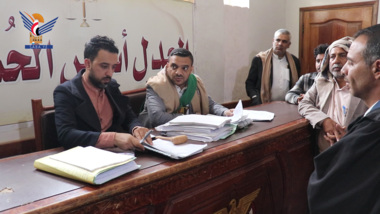
Sana’a – SABA:
The Specialized Criminal Court in the capital Sana’a decided today to summon a new individual in the case of the accused Ali Abdulaziz Abdullah Al-Sarfi, who is facing charges of committing a series of brutal, methodically executed murders.
During the session, presided over by Judge Yahya Al-Mansour and attended by Prosecutor Khaled Omar, the defendant requested the summoning of a person identified as Sheikh (M.S.), whom he claimed was his accomplice and the mastermind behind the crimes. Al-Sarfi further alleged that he was under the influence of hallucinogenic pills provided by the said individual, which impaired his will.
The families of the victims also demanded the summoning of (M.S.), noting that the prosecution had previously decided not to pursue charges against him. However, they argued that since Al-Sarfi is now shifting responsibility, the individual in question, along with others allegedly involved—including Al-Sarfi’s brother—must be investigated for their roles in aiding and abetting the crimes.
The families further requested the court to delay proceedings until a ruling is issued by the Specialized Appeals Division concerning their appeal against the prior decision not to prosecute (M.S.) and others.
The prosecution presented a detailed memo outlining the timeline and nature of the crimes, accusing the 25-year-old defendant of carrying out a series of gruesome killings between October 7 and October 18, 2024, in addition to a separate incident on September 22, 2024, in which he allegedly lured and murdered three individuals, stole their money and weapons, and attempted to kill a fourth person for the same purpose.
The memo described the case as a threat to public safety and social peace, emphasizing the exceptional seriousness of the crimes and the necessity for severe punishment in line with the horror of the offenses committed.
It included conclusive evidence and clear proof of the defendant’s involvement, characterizing the crimes as examples of organized, premeditated criminality, revealing a dangerous and remorseless criminal mindset.
The prosecution emphasized that the repetition of the crimes using the same method indicates a high level of threat to society, warranting the maximum penalty under Islamic and civil law. The case is seen as a critical test of the justice system’s ability to deliver both specific and general deterrence, and to safeguard society from individuals who have no regard for human life.
The memo underscored that the killings violated one of the most fundamental human rights – the right to life, guaranteed by both Islamic Sharia and national law, and pointed to the deep public outrage and psychological trauma caused by the crimes.
The court has now officially approved the summoning of the new individual, as well as witnesses involved in the initial investigation records, and granted the victims’ families additional time to present their civil claims and supporting evidence. The next session is scheduled to resume after the Eid al-Adha judicial recess to continue the trial proceedings.




